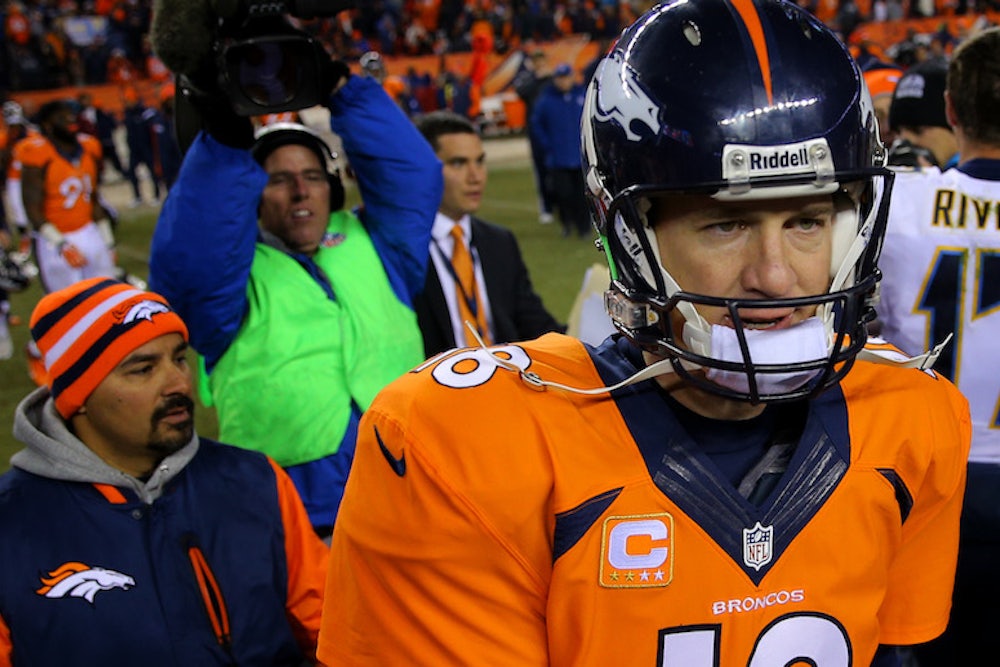Your 2013 Sports Illustrated “Sportsman of the Year”—announced Sunday night during halftime of “Sunday Night Football" on NBC, with which SI is a content partner—is Denver Broncos quarterback Peyton Manning. Sports Illustrated, as the Time of sports, is supposed to be mainstream, and who is Manning if not the Pope of the sports world? Still, the choice is wrong on the merits, and goes a step further by revealing how outdated those merits are.
For one thing, they picked the wrong year. 2012, when Manning returned from four neck surgeries to lead the Broncos, in his first year with the team, to a top-seed, was a much more dramatic campaign. This season has been statistically superior (potentially historic), but we don’t know where it will end up. In deference to this awkwardness, Lee Jenkins’ write-up treats Manning as, essentially, the Sportsman of the Years: “On his first day as a Bronco [in 2012],” “It is an overcast Friday morning in Indianapolis [in 2012],” “He barred his beloved equipment guys from the goodbye press conference [in 2012],” “Four days later, the Colts … cut him [in 2012].” The most consequential game Manning played in 2013 was a playoff loss in which he nearly matched his three touchdowns with two interceptions, the optics of which were made worse by his lifetime losing postseason record. His most impressive game, by contrast, came in a Week 1 contest—traditionally a defense-lite portion of the season—against the same team, which had lost several defensive stars. Sportsman-of-the-year-ness should be made of sterner stuff.
But that’s not the biggest problem. The best selections have been figures whose on-the-field accomplishments have been so undeniably massive (Tiger Woods winning three majors in 2000, LeBron James conquering basketball last year) or whose massive on-the-field accomplishments have synergized with a cultural impact that transcends those accomplishments (the U.S. Women’s Soccer Team winning the World Cup while bringing greater awareness to female athletes, Drew Brees winning the Super Bowl and serving as the face of post-Katrina New Orleans). By contrast, what has Manning got? Impressive but not world-beating on-field play—let’s be honest, you really need a championship to claim that. A recovery story that is certainly impressive but not exactly inspirational: It isn’t like he beat cancer, a la Lance Armstrong in 2002, or regained the heavyweight belt after going to prison for refusing to serve in the military (Muhammad Ali, 1974).
The article notes Manning’s charitable activities, which are great. But far more persuasive was the SI writer who, in picking his own personal choice for Sportsman of the Year, noted that LeBron James—who just won another MVP, another championship, and at this point is so good he’s basically playing some sport that isn’t even basketball—runs “philanthropic efforts—highlighted by a program that brings every at-risk third grader in the Akron public school system into an educational cocoon conceived and funded by James.” That SI writer was none other than Jenkins, author of the Manning cover story, who also noted, “We have entered an age when James could win Sportsman of the Year every year and probably should.”
That’s my feeling, too. Besides, James is the most culturally relevant athlete in the world’s most culturally relevant (if not, yet, most popular) league, one that is providing a paradigm for how talented, young, overwhelmingly black young men can take control of their games, their brands, and their destinies (The Decision, anyone?). Manning is a 37-year-old white guy who plays half the time and whose greatest strength is operating an offensive system that about two dozen other living people are capable of fully grasping.
Still, I understand if SI doesn’t want to give James the award two years in a row (the only repeat winner ever, in fact, appears to be Tiger). Hell, they already essentially named him Sportsman of the Decade, and that was before the best had come. The Nation’s Dave Zirin offered several alt-candidates Monday morning. These were certainly thoughtful—Jason Collins, the first out major-sport athlete (sorta: he hasn’t played since coming out); Dr. Robert Cantu, the face of the fight against the NFL’s concussions crisis. This blog post makes the case for the two athletes most felt likely to get the nod: Mariano Rivera, one of the greatest pitchers of all time, who completed his final season with class, style, and 44 saves after missing the previous season; and David Ortiz, who led the Boston Red Sox to a championship—not the only dramatic sports-related thing to happen to Boston this year—with a dizzying postseason performance at the plate.
To split the difference, though, here is my pick for Sportsman of the Year (other than LeBron): NFL Commissioner Roger Goodell, whom none other than Time itself slapped on its cover a year ago. He is the most important figure in the biggest league. He is the public face of that league’s pained efforts to deal with an absolutely existential threat. He has been in the news announcing a landmark legal settlement related to that threat; a locker room bullying scandal; and the alleged compromising of the most important sports media outlet’s editorial credibility. Exactly one previous commissioner has been selected Sportsman of the Year: Pete Rozelle, of the NFL, in 1963. Naming Goodell would have conveyed a powerful editorial observation: That in the sophisticated year of 2013, sports are best illustrated by things that happen off the field.
An earlier version incorrectly stated that no commissioner had ever been named Sportsman of the Year.
